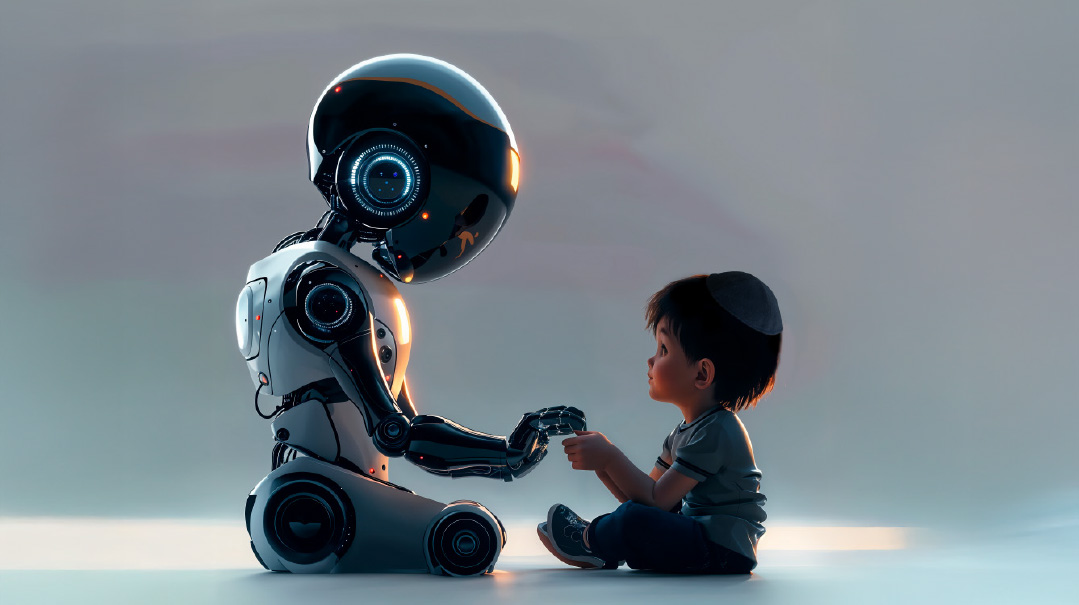The Hazards of AI for Young People
| December 10, 2024We can offer something better to our children than a pretend world with pretend love

AT
a recent therapy session I had with a young Jewish man, he told me he often ruminates about deep questions: Why are we here? Why did Hashem choose the Jewish People to give the Torah to? And why does Hashem allow evil to exist in the world?
I advised him that these were very deep questions and perhaps he could seek out a rabbi to find helpful answers.
“I look up the answers on AI,” he told me.
“I think a rabbi might be more helpful,” I said.
He answered, “Well, I tell the AI to answer as if it were a rabbi.”
Did that make you shudder? When I heard it, I certainly did. But as a good therapist, I suppressed my reaction.
But why did it make me shudder? I think the answer is simple. However, it should be elaborated upon so we can recognize the hazards AI presents.
AI is a computer program. It has no feelings, no love, no soul. If this young man had sought out a rabbi, he would have received information, just as AI provides. But more importantly, he would have encountered another person who understands and cares about him and can empathize. Information cannot ultimately soothe an aching soul — only another caring soul can.
The confusion between actual human intelligence and synthetic intelligence is one of the many dangers of AI that impacts the younger generation.
In a world that increasingly relies on AI, young people are at risk of losing touch with reality and with real human connection, which could have monumental consequences on their lives.
Many readers might respond, “Not my kids! I don’t let them have a smartphone.” If that applies to you, great. But don’t assume that your kids are immune. All it takes is access to the Internet to make them vulnerable to the attractions of this synthetic world.
Why Do Young People Like AI?
Decades ago, when people were bored, they’d get dressed up and go out and interact with others. With the invention of television, they could stay home, sit in front of the TV, and still feel connected to the world.
Over time, though, we saw that sitting in front of a TV all day was kind of sad. People realized they still needed to be around others.
Then, the Internet came around, and with it, social networking. We could use the devices in our pockets to talk to people and not feel so lonely. Young people, who grew up with this technology, have been using it since childhood. As they’ve gotten older, some show diminished capability for real-life interaction. Their social skills atrophied as they looked more at screens than at other people’s faces. Instead, they could rely on the artificial socialization they got online.
Even there, though, real people were on social networks — and sometimes they could be mean or challenging. What if you said the wrong thing on Facebook or Instagram? What if you made a YouTube video and people left negative comments? What if online social interactions left you feeling bad about yourself?
Many young people, whose social skills were already lacking, didn’t want to take that risk. So they turned away from interacting with real people and now focus on AI instead.
They want something that humans can’t provide them: constant attention and no criticism. They think, “Let me go to AI, and I can instruct it to be who I want it to be.” There are no risks… right?
Social Dangers
Interacting with AI instead of with real people may seem harmless.
In many ways, AI is an ideal friend. It’s never tired. It always pays attention to you. It strives to be non-offensive and makes no demands. And it takes what it learns about you and becomes smarter over time, providing responses that perfectly suit you.
However, this “relationship” can become a rabbit hole, a world of fantasy. AI doesn’t care about people. But the human need for attachment overrides the better judgment of many young people to make them feel like they have a friend in AI. Sadly, tech companies are happy to exploit these human needs.
The allure of this AI friendship often becomes an obsession, robbing the young person of time that could be used on real relationships, sleep, and self-care, all of which are important for maintaining mental and physical health.
Furthermore, the social skills needed to maintain a real relationship atrophy, resulting in a vicious cycle, pushing the unfortunate person deeper and deeper into the AI obsession.
Loneliness is a very important and well-known psychological risk factor of overusing technology and AI. The younger generation often depend on their phones for any type of interaction and are experiencing very little connection amid soaring loneliness rates.
AI is socialization junk food. At first, it may make users feel like they are getting what they need from it. But in the end, they will be left feeling emptier and lonelier than ever if they don’t get real human connection. AI pretends to be offering them something, while it is actually depriving them of an attuned and caring ear that could make all the difference in their lives.
What Can We Do?
Parents have to watch their children and see what they’re doing. What makes them hide too much at home or in their room? Their phone? Their computer? Video games?
Parents must also encourage their children to participate in social activities, especially ones that are challenging. In our generation, kids don’t want to be uncomfortable. And seeking comfort itself can become an addiction. We need to teach children that it’s okay to be uncomfortable; when we embrace the possibility of discomfort, we can begin to grow.
Parents also need to discuss with their children, in an age-appropriate manner, all of the issues with AI, and provide appropriate limits, supervision, and guidance.
Although the AI conundrum challenges all young people, we as Jews have a certain advantage in our efforts to avert harm to our children. We have Shabbos, when we are free from all technology; and we stress the importance of in-person interaction at school and beyond.
AI will become more prominent in our lives — that’s for sure. But it’s up to us how much we let it in. Used appropriately, it can have some value. But if misused, it will rob us and our children of human connection, purposeful behavior, and a true appreciation for emes.
It is a well-known concept in Judaism that the essence of love is giving. AI has no needs; nothing can really be given to it, so a young person immersed in a relationship with it will not be able to experience true love with it. But the young person may emotionally mistake this relationship for love. We can offer something better to our children than a pretend world with pretend love.
Michael Milgraum is an attorney, psychologist, and author. He has a private psychology practice in Kensington, Maryland. His latest book is To Seek a Larger Spirit: Reflections of a Jewish Psychologist (Guidelight Books).
(Originally featured in Mishpacha, Issue 1040)
Oops! We could not locate your form.







